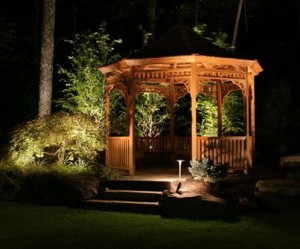One of the best parts of summer is the warm, dark nights which just beg for star gazing. However, in the 1980s, astronomers began to notice how much harder it was to see the stars, thanks to light pollution from residences. While illuminating your yard can be important for safety reasons as well as making it more conducive to evening use, these steps will help you cut down on the light pollution you accidentally emit.
Turn Out Porch Lights
Although leaving a light on through the night may add a sense of security, turning out the light will prevent light pollution and save you money at the same time. You may want to consider switching out bright floodlights for low-voltage path lights.
Timers
Using these will also save you money every month, since they turn appliances off at a set time. They’re also good ways to add more security to your home when you’re gone for more than a night.
Motion Sensors
More convenient than timers and more money saving than leaving a light on all night, motion sensors only go off when you or someone else triggers them. They’re convenient when you have your hands full and make your home a safer place.
 Low Glare Fixtures
Low Glare Fixtures
Look for the International Dark Sky Association’s stamp of approval when shopping for lighting fixtures to add to your Minnesota home’s landscaping. Some companies, like Starry Night Lights, specialize in low glare lighting.
New Bulbs
Replace your old bulbs with more energy efficient bulbs like LED and CFL lighting. Using these bulbs in fixtures that direct light more proficiently cuts down on lumens sent into the sky.
Target Lighting
An outdoor lighting contractor can help you design a lighting plan which incorporates low-voltage lights that are strategically placed to softly illuminate specific areas rather than casting a widespread, bright light. For instance, if you want to light up your walkways for safety as well as ambiance, path lighting can be much more inviting than floodlights which light up an entire section of yard.
Some research has shown that light pollution also affects the local ecology, due to its influence on nocturnal animals. It can also affect our natural circadian rhythms, which is what dictates when we sleep and when we’re awake. Once you take these steps to a night sky friendly lifestyle, you’ll be helping the local ecological environment and you may get a better night’s sleep, too.
